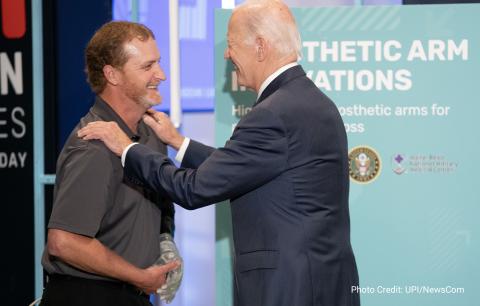Researchers from Case Western Reserve University’s Human Fusions Institute (HFI) recently displayed their work at "American Possibilities: A White House Demo Day" in Washington, D.C. The event was hosted by the White House Office of Science and Technology Policy.
While more than 40 groundbreaking innovations from around the country were highlighted, HFI’s iSens system was one of three selected to be presented to President Joe Biden.
The iSens system, designed in the HFI lab directed by Dustin Tyler, the Kent H. Smith II Professor of Biomedical Engineering at the Case School of Engineering, allows those with limb loss to move the prosthesis by thought and provides sensation that feels to the user like the prosthesis is their actual hand. This technology comes as close as possible to replacing the lost limb, providing individuals with a sense of touch and the ability to control their prosthesis by simply thinking about moving their own hand. The system is the result of 15 years of funding from the Department of Veterans Affairs and DARPA HAPTIX and RE-NET programs, and the lab remains committed to developing technologies to change the lives of individuals who have lost limbs and improve human health through innovation.
Study participant Brandon Prestwood got the chance to demonstrate for Biden the system he believes changed his life.
"It's an honor to meet President Biden, and I will cherish it forever," Prestwood said. "You can just look at somebody's face and see what they care about, and one can tell that President Biden cares about healthcare."
Prestwood hopes the Biden administration and future administrations will do their part to make advances in technology. "If we push the technology forward,” he said, “we can help more people."
Prestwood emphasized the positive impact the technology had on him, describing the first time he held his wife's hand since losing his arm in a 2012 conveyor belt accident as the "pinnacle" of his life. "Everyone has put time, money and dedication into improving people's lives,” he said, “and it's wonderful to be part of that experience."
Leah Roldan, a PhD student in Tyler's lab who accompanied Prestwood, said Biden was especially interested in how the technology worked.
"President Biden was very friendly and very interested in our study participant's experience," she said. "It was very cool to have him there."
Roldan, who has been working with this study participant for over five years, loves seeing what it means to participants to feel the sensation.
"(Our technology) has such a strong emotional impact," she said. "When you get to know the person, you understand how big it is."
“With so many impressive technologies on display at this event, it was an honor that CWRU was one of only three organizations selected to meet face-to-face with President Biden,” said Project Manager Bob Michaels. “That says a lot about the impact that we are making.”


